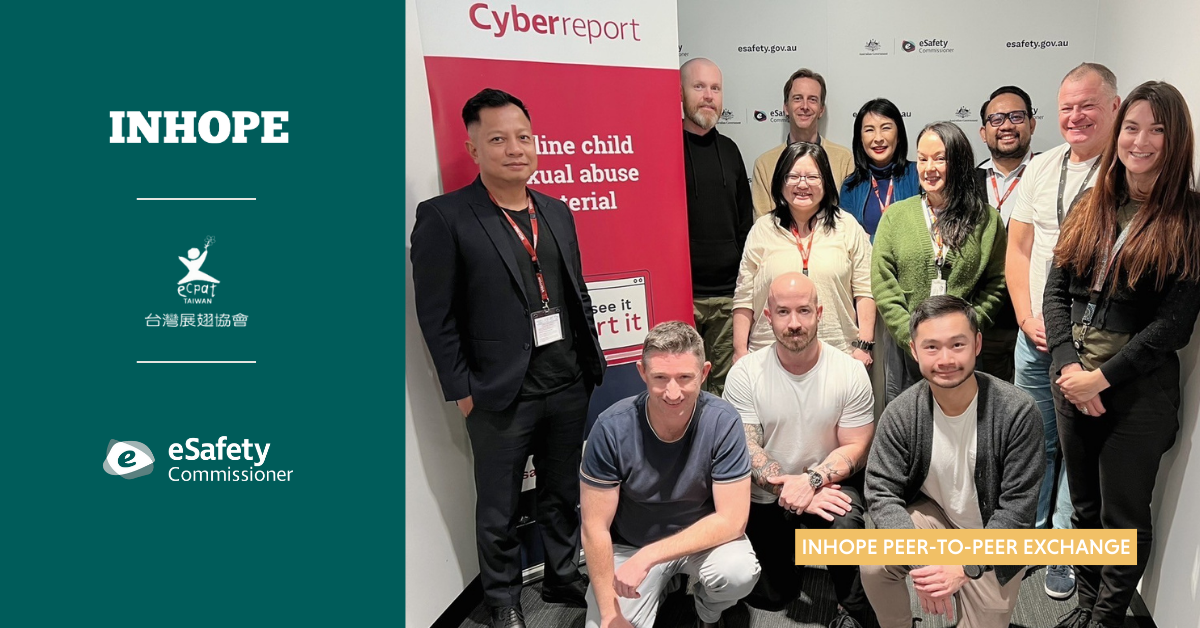Article
Hotline & Network Updates
Peer-to-Peer Exchange Interview: ECPAT Taiwan Visits eSafety
Peer-to-peer exchanges are an invaluable part of INHOPE’s training and capacity-building efforts, helping to strengthen relationships between members and facilitating knowledge-sharing across the network. We asked Claire Chen from the Taiwanese hotline, ECPAT Taiwan, to share her experience of the exchange, which took place in June 2024, at the Australian hotline, eSafety Commissioner.
Can you tell us about the objectives of the exchange?
The main goal was to share expertise in handling child sexual abuse material (CSAM) reports. We had the chance to learn about eSafety’s work environment, meet their staff, and understand how their hotline operates. This included the types of reports they handle, how they process them, and their victim identification procedures. We also gained valuable insights into their educational programmes aimed at child protection.
What were the highlights for you?
One thing that really stood out was how the hotline has specialised reporting teams, each with specific responsibilities. This allows them to focus on particular areas, making their response methods highly efficient and tailored. I was also really impressed by the work environment. It’s clear that the staff are very supportive of one another, which creates a positive atmosphere.
What were your two main takeaways from this experience?
A major takeaway was the importance of advocacy and oversight strategies with tech companies. Beyond just promoting self-regulation on child protection issues, eSafety will issue notices requiring tech companies to regularly report on their compliance with the Basic Online Safety Expectations. Additionally, eSafety will publish regular transparency reports. This approach holds tech companies accountable and drives continuous improvement.
The second takeaway was how much value they place on a supportive work environment. I noticed several details in their office designed to reduce stress and help staff manage their emotions, such as screens playing stress-relief videos.
Did you learn anything new that you plan to implement at ECPAT Taiwan?
Absolutely! We’re currently rebuilding our hotline website and database system, and the insights I gained from eSafety’s approach to system management will be incredibly useful for that. Their efficiency and organisation have given me some great ideas on how we can improve our own systems.
What improvements would you suggest for future exchanges?
I think it’s really beneficial to have 2-4 organisations participating in these exchanges together, as it encourages more interaction and learning. However, if the hotline organisations could send more than one analyst to participate, I believe it would be more beneficial for both the hotline and the analysts. Unfortunately, the limited budgets of individual organisations would be a significant obstacle. Perhaps INHOPE could consider establishing some principles and providing more detailed assistance programs to support and encourage hotline organisations in need.
INHOPE’s peer-to-peer exchanges play a crucial role in building the skills and knowledge of hotlines across the network. By fostering collaboration, these exchanges allow participants to learn from each other’s experiences, share best practices, and strengthen relationships. This collective knowledge helps to improve the efficiency and effectiveness of hotlines, ultimately supporting the global effort to protect children online.
